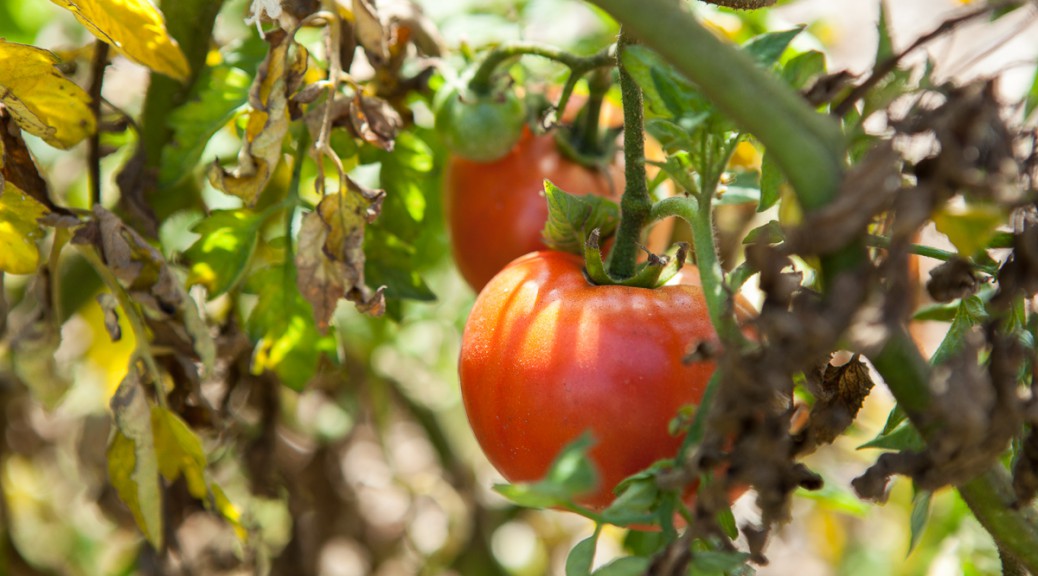[Image: Red tomatoes growing on a vine.]
Tonight for dinner I made a one pot meal, pasta e fagioli, consisting of three packaged ingredients: Pasta, beans, and sauce. The normal recipe I use for this dish calls for a lot more ingredients, cookware, steps, and time, and ideally I would use beans I’d cooked myself. But this simpler, faster version was perfectly tasty and satisfying.
I think both vegans and non-vegans sometimes overthink what it takes to make a good home-cooked meal. I realize that most people would not be satisfied having a meal consisting entirely of yams or bananas as I was experimenting with for a month, but there’s no need to combine proteins or to count and track calories or grams of anything, unless you have special health needs.
What about greens? Ideally I would have made a salad to go with the pasta, but I didn’t feel like it. Most health professionals agree that eating green vegetables is very good for us, but doing so actually has nothing to do with being vegan. Being vegan doesn’t mean choosing between a steak and a salad, it means choosing between a steak (with optional salad) or a bowl of vegetable chili (with optional salad). Some vegans do choose to just eat the salad, but most people can’t get full enough on green vegetables alone, as they’re very low in calories. And non-vegans who eat nothing but steak are going to suffer from nutritional deficiencies sooner or later.
As I’ve posted before, it’s a serious problem that many people in the USA do not have access to affordable fresh fruits and vegetables. And even the simple meal I made tonight, consisting entirely of packaged ingredients from Trader Joe’s, would be out of reach for those who have very low incomes, lack access to a kitchen, or work so hard that they simply have no time to cook. But not being able to afford nutritious food is a problem for non-vegans as well as vegans. We must address income disparities, rather than just blithely repeating how easy it is for everyone to be vegan.
Veganism is more than a plant-based diet; it is an ethical stance against violence. But eating is an activity most humans participate in multiple times a day, every day, often in the company of others. So our food choices have a significant impact, not only on ourselves, but on those around us. Those who do have the money and access to shop and cook would do well to investigate simple vegan meals. I like the Happy Herbivore cookbooks (tonight’s pasta recipe came from Happy Herbivore Abroad) and Simply Vegan, but there are also thousands of vegan recipes on the Internet.
Don’t let fear of malnutrition or complicated meal planning stop you from going vegan. Keep it simple, and always remember the lives at stake.

But what about the moral baseline? Jk…thanks for posting Pax 🙂
😉 I was convinced after reading Until Every Animal Is Free (which I’ll be blogging about soon – great book, I’m friends with the author) that we need to talk about diet even though we know that veganism isn’t just a diet. People need practical information, not just lectures on ethics.
For most of us…the place where the practice of veganism impinges on our lived lives is in our diet…that’s also the place…for most…that presents the biggest obstacles to overcome because of ‘tradition’, memories and experiences. Thanks for this.
Pax, I came across some of your very well articulated comments on a recent DxE blog post about the ineffectiveness of “boycotts”. Your points about the dangers of dismissing veganism as “doing nothing” were really well thought out and important. Would you consider writing a post specifically on this issue? The confused messaging around veganism/activism in some organizations is troubling and confusing for many, to put it mildly.
Thanks – I will consider writing such a post. I’m trying to strike a balance between advocating for animal rights and criticizing other animal rights activists, as I feel there’s been too much of the latter lately.